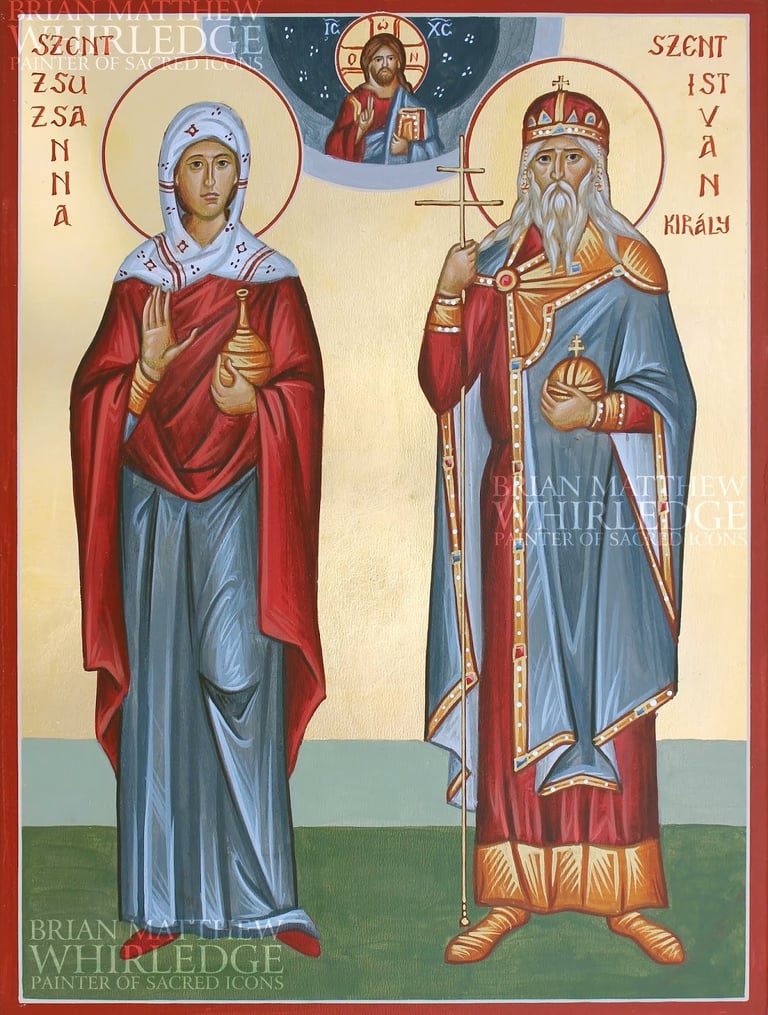Mothers of the Church Part 2: Susanna the Holy Myrrhbearer,And Women of Gallilie
3 Mothers of the Church Who Defied Darkness, and Why You Should Walk With Them This Spooky Season. A 4-Part Fall Power Women Series.
FAITH


The Power of a Forgotten Saint
In every generation, God raises voices that terrify the forces of evil. Some of those voices resound loudly through history, prophets like Elijah, apostles like Peter, or martyrs like Stephen. Yet in the quiet lines of Scripture, other names appear, seemingly small, but with eternal significance. Susanna is one of those names. Mentioned briefly in Luke 8:1–3, Susanna is remembered alongside Mary Magdalene and Joanna as a woman healed by Christ and a financial supporter of His ministry. At first glance, it may seem like a minor footnote. But the spiritual reality is profound: Susanna’s life is a living contradiction to the schemes of the fallen one and his agents.
There is no “kingdom of darkness.” Christ is King and Lord, and no other. The fallen one is no ruler, only a pretender whose strength lies in deception. But women like Susanna expose him for what he is: defeated, dethroned, desperate. This article will explore why Susanna is hated and feared by evil spirits, how her life becomes a model of spiritual warfare for women today, and how her witness still carries power to transform despair into freedom.
Healing That Exposes the Lie of Bondage
Luke notes that Susanna was among the women healed by Jesus. While the nature of her affliction is not described, the significance lies not in the detail but in the reality: she was set free.
Evil spirits thrive on convincing their victims that bondage is permanent. They whisper lies: “You will never be whole. You are broken beyond repair. You are defined by your past.” For countless women, these lies echo after trauma, abuse, rejection, or failure. Susanna’s healing is a direct contradiction to that lie. The moment Christ’s power entered her life, the grip of the enemy shattered. What was once her shame became her testimony. Evil spirits hate her because her existence is a permanent reminder that no chain is unbreakable. Every time her name is read in Scripture, every time her example is remembered, women everywhere are reminded that freedom is possible. That reality alone makes Susanna a terror to the fallen.
Stewardship as Spiritual Warfare
Susanna did not merely follow Jesus in gratitude; she gave. Luke tells us she and other women supported His ministry out of their own resources.
This act of generosity is spiritual warfare in action. The fallen ones use money as one of their strongest weapons. Through greed, fear of scarcity, debt, and corruption, he enslaves lives and families. But Susanna redirected her wealth to fuel the very mission that was undoing his works.
Every meal she provided for the disciples, every shelter she helped secure, every journey she enabled, all of it struck directly against the counterfeit rule of darkness.
Demons hate when resources are consecrated to God because it robs them of leverage. Money, once a chain of bondage, becomes a sword of liberation. In Susanna, women see that their resources, whether financial, relational, or vocational, can be transformed into holy instruments of God’s kingdom.
Witness That Silences the Deceiver
Susanna was not hidden in the background. She was a witness, present, known, and faithful. Like Mary Magdalene and Joanna, she was among the first proclaimers of Christ’s works.
Evil spirits despise witnesses because testimony strips away their power. They operate best in secrecy and shame, where voices are silenced. But when a woman speaks of what God has done, lies crumble. In the first century, women’s voices were often disregarded in courts and councils. Yet Christ chose women, including Susanna, as central witnesses to His ministry and resurrection. This choice is not incidental. It is a divine strategy: the very voices society overlooked became the first heralds of victory over death.
Today, Susanna’s presence in the Gospel still shouts across history: women’s testimonies matter, women’s voices matter, women’s witness exposes deception. For this reason, the fallen ones hate her memory because it emboldens women to speak the truth.
Why the Fallen Still Fear Her
Evil spirits hate Susanna for reasons that remain relevant:
She proves women cannot be silenced. Lies of worthlessness fall apart in the light of her testimony.
She breaks generational curses. By turning her life and resources to Christ, she destroyed cycles of bondage
She consecrates wealth to God. Every gift she gave was a blow to the demonic schemes of greed and fear.
She unmasks deception. Her witness demonstrates that secrecy and shame cannot endure where truth is spoken.
For the fallen, Susanna is not just a forgotten figure. She is a constant reminder that every scheme he deploys, bondage, greed, silence, and shame, is already defeated in Christ.
Cultural Counterfeits: Witchcraft and False Power
It is no coincidence that modern culture glorifies “witchy” power, covens of three, and occult identities, especially for women. These counterfeits mimic the reality of Christ’s trio of female disciples: Mary Magdalene, Joanna, and Susanna. The fallen know that women are powerful witnesses of Christ’s healing and freedom. So he offers counterfeits: spells instead of prayers, manifestation instead of trust, covens instead of communion.
For women who have been wounded, abused, or silenced, these counterfeits feel like empowerment. But they enslave rather than free. They promise identity but deliver deeper bondage. Susanna’s life is the antidote. Her healing reveals true freedom, her stewardship reveals true power, and her witness reveals true identity. She shows that women need not cloak themselves in darkness to find strength; they already carry the image of God, restored by Christ.
A Devotional-Prayer Guide with Susanna
To draw strength from Susanna’s example, women can pray alongside her story:
Prayer of Healing
“Lord Jesus, as You healed Susanna, heal me. Break every chain of fear, shame, and trauma in my life. Make me whole in Your name.”Prayer of Provision
“Like Susanna, I offer my resources to You. Use what I have as a weapon against darkness. Multiply it for Your kingdom.”Prayer of Witness
“Father, give me courage to testify of Your works. Let my voice expose lies and bring light to others.”Prayer of Intercession
“Saint Susanna, faithful disciple, pray for me as I walk in your example. Ask the Lord to make my healing, my giving, and my testimony strong weapons against the enemy.”
These prayers are not magical incantations. They are declarations of trust in Christ, aided by the witness of a woman who lived out victory.
Susanna as a Model for Women in Spiritual Battle
Susanna shows that women who are healed become healers, women who give become providers for the Church, and women who testify become voices of liberation.
For women under attack, through depression, anxiety, shame, or trauma, her story is a weapon. Her healing says, “You are not broken forever.” Her giving says, “Your resources are powerful when surrendered to God.” Her witness says, “Your voice matters.”
The fallen fear Susanna because she proves that once-afflicted women can become the fiercest warriors of Christ.
A Call to Action: Walking in Susanna’s Example
Susanna is not just a saint to remember; she is a mentor beyond time. Women can imitate her by:
Seeking healing in Christ for wounds of the past.
Offering their resources to fuel the Gospel’s mission.
Bearing witness boldly in their homes, workplaces, and communities.
Praying with her intercession for protection and guidance.
To the fallen, every woman who follows Susanna’s path is a new nightmare, another reminder that their counterfeit power cannot endure.


Writers Note:
A good portion of you are Protestants; additionally, so are many of our contributors. The below is not meant to offend or snub your belief in Christ. To my protestant brothers and sisters, we are offering this note to provide some free exposure to the thought behind intercession from the Saints.
Susanna is honored among the Myrrh bearers, the women who followed Jesus and came to His tomb, intending to anoint His body with myrrh, only to discover that the grave was empty. This means she was a close member among his followers.
Susanna was also one of the women who stood with John and our Holy Mother, Mary. Because of this (At least for those who pray the rosary) she it can be assumed she is very close with Mary, having financed Jesus's ministry in life and standing with His mother when he died. Because of this, she is also personally close with Our Mother, having shared in her sorrow before the Cross.
Additionally (Directly From Catholic.com) "A good idea when praying the rosary would be to ask for her intercession in Revelation 5:8, where John depicts the saints in heaven offering our prayers to God under the form of “golden bowls full of incense, which are the prayers of the saints.” But if the saints in heaven are offering our prayers to God, then they must be aware of our prayers.
Some might try to argue that in this passage, the prayers being offered were not addressed to the saints in heaven, but directly to God. Yet this argument would only strengthen the fact that those in heaven can hear our prayers, for then the saints would be aware of our prayers even when they are not directed to them!"
Healing That Exposes the Lie of Bondage
Luke notes that Susanna was among the women healed by Jesus. While the nature of her affliction is not described, the significance lies not in the detail but in the reality: she was set free.
Evil spirits thrive on convincing their victims that bondage is permanent. They whisper lies: “You will never be whole. You are broken beyond repair. You are defined by your past.” For countless women, these lies echo after trauma, abuse, rejection, or failure. Susanna’s healing is a direct contradiction to that lie. The moment Christ’s power entered her life, the grip of the enemy shattered. What was once her shame became her testimony.
Evil spirits hate her because her existence is a permanent reminder that no chain is unbreakable. Every time her name is read in Scripture, every time her example is remembered, women everywhere are reminded that freedom is possible. That reality alone makes Susanna a terror to the fallen.
Christ is King, Susanna is Witness
The story of Susanna may occupy only a verse, but in eternity it reverberates like thunder. Her healing, her giving, her witness, all are proof that Christ reigns and the fallen one is a liar. There is no kingdom of darkness. Christ is King and Lord. The only reign of the enemy is deception, and Susanna’s life unmasks it.
Do not forget also, God has granted power to the fallen in this world, but take heart. It is not to assist with your destruction; they are utilized as witnesses to your purpose and the divine calling God has in your life. Evil is graciously offered as an example of life without the one who loves you without fault.
Your relationship with God is meant to not just heal you of affliction, but as with Susanna, give testimony to yourself and the world of the truth that there is permanent freedom from affliction (both demons and the kind of guys who wear the clothing line).
For every woman who feels silenced, shamed, or bound, Susanna’s testimony speaks across centuries: healing is real, provision is holy, and your witness matters. To the powers of evil, she is dangerous. To the daughters of God, she is a guide. To the Church, she is a mother. And above all, she is a reminder that the story of every woman redeemed in Christ is not bondage, but victory.
Did you enjoy this read? We have a Four-part series on these three women coming out in the next week. Please Consider Donating so we can continue this work.
Click HERE For More.
Our next article is "Joanna: A Quiet Witness with a Sacred Role" reflects many sacred roles and virtues. She was the wife of Chuza, a steward in Herod’s household; a financial supporter of Jesus’ ministry; and, most importantly, she was chosen by Jesus Himself through the will of the Father.
The Gospels note that Herod was curious about who Jesus was and showed interest in His works. It is very likely that Herod first learned of Jesus of Nazareth through Joanna, by way of her testimony and experiences, relayed to her husband Chuza. In this, Joanna models the way we too are called to witness Christ to others: humbly, faithfully, and giving glory to God for every work of the Gospel.
Why Witchcraft and Magic “Work”, and Why It’s a Trap
“You are created in God’s own image and likeness.” These words are familiar to most Christians, yet their depth is rarely contemplated. Humanity was not designed as a shadow of God but as His reflection, imbued with voice, will, and creative authority. When we speak, when we arrange, when we declare, we are exercising the same faculties of the One who spoke light out of darkness and called order into being.
This reality reveals why witchcraft and occult practices often appear to “work.” Their efficacy does not lie in the spell itself, nor in the practitioner’s isolated power, nor even in the arrangement of candles, herbs, or incantations. Instead, it is because such actions are manipulated by ancient, fallen beings, spirits who stood before time, who witnessed God fashion creation, and who recoiled in rebellion when humanity was exalted above them. Our very existence, crowned with divine dignity, is the offense that sparked their revolt.
These spirits understand the latent capacities woven into human beings by God Himself. When a person enters into witchcraft, she is effectively surrendering her God-given faculties to powers that despise her. What follows may feel tangible, curses that cling, manifestations that unfold, desires seemingly met, but beneath every outcome is the same reality: bondage. Even our cultural imagination hints at this truth. Consider the Harry Potter saga, where each curse or horcrux carries a cost, eroding the soul of its wielder. Witchcraft mirrors this perfectly. It promises mastery but delivers servitude. It promises identity but corrodes the self. It offers wonder, only to consume.
Susanna, Mary Magdalene, and Joanna each bore the marks of this battle. Their lives, prior to encountering Christ, reflected what countless women today still endure: the torment of things that appear stable yet collapse without warning, the haunting sense that one is never fully safe, the fear that the shadows define their destiny. This quiet ache is familiar to survivors of abuse, to women drawn to the occult out of desperation for control, to those who wear the mask of “spooky season” as a way of cloaking pain in temporary empowerment.
Yet Christ interrupts this cycle. In Him, the masquerade is stripped away. The counterfeit loses its luster. The same voice that summoned creation calls each woman by name, restoring her true authority and silencing the lies that enslave. Those voices in the mind, the ones insisting freedom is impossible, that witchcraft offers answers, that darkness is safer than light, are not companions but captors. They long to exploit, not to heal. This is why they fear Susanna and the women like her. She embodies what they cannot undo: a woman healed, restored, and empowered not by rebellion but by grace. Her testimony is a mirror to women today, proving that the mouth once used in self-destruction can be sanctified to speak blessing, intercession, and life.
So, resist them. Rebuke them. Remember what they hate: that your voice is not ordinary. It is created in the image of the Eternal Word, and it was meant to shape life, not death. Christ redeems what the enemy twists, and Susanna stands as an enduring witness that the light of Christ not only heals but terrifies the darkness.


Written By: Gabriel Merigian & AD FAITH
AD news Editorial Team collaborates on stories in-house and with external reporters to bring you exclusive pieces, like this one.


